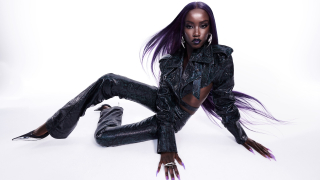On October 21st, 19-year-old Trayon Christian filed a lawsuit against Barneys Department store and the NYPD. The engineering student alleged he was wrongfully detained on April 29th, after he purchased a $350 Ferragamo belt. He told NBC New York, “As soon as I hit to the next block of the corner, the undercover cops stopped me, and that was it. They arrested me.”
What does this unfortunately all too familiar instance of racial profiling have to do with Shawn “Jay Z” Carter? That’s what the hip-hop mogul wants to know.
After a week of being pressured to comment on the incident in light of his highly publicized holiday collection with Barneys, Carter released a statement on his Life and Times website asking “Why am I being demonized, denounced and thrown on the cover of a newspaper for not speaking immediately? The negligent, erroneous reports and attacks on my character, intentions, and the spirit of this collaboration have forced me into a statement I didn’t want to make without the full facts.”
But Trayon’s allegations against Barneys conjure associations with the rapper for a few reasons. As one Facebook friend put it, the luxury retailer was likely targeting young fans of Jay Z, many whom look like Trayon. But perhaps the reason that most counts is his connection to the store at this exact time offers the perfect opportunity for him to extend the statements he makes about racial profiling in his music to a real world situation he can actually influence.
More details will emerge from Trayon Christian’s incident and the subsequent accusation levied against Barneys by another complainant; we’ll have to wait to find out exactly what happened. Jay Z may be right not to rush to judgment, but considering his leverage with the store and in the culture at large, he’s in a position to bring attention to the chronic problem of racial profiling and catalyze change both in his native New York as the NYPD’s controversial “Stop and Frisk” policy undergoes vigorous debate in the wake of the upcoming mayoral election, and across the country.
Over the last two years specifically, the rapper who famously reenacted a profiling stop on his hit “99 Problems”—[Trooper] “Son, do you know why I’m stopping you for?” [Jay Z] “ ‘Cause I’m young and I’m black and my hat’s real low”— has been under increasing pressure to spend his social and political capital to advocate for social causes.
Last August, legendary actor and activist Harry Belafonte, 86, told The Hollywood Reporter that Carter, 43 and his wife were among a “sad” group of powerful celebrities of color who “have turned their back on social responsibility.”
Carter clapped back in a verse on his song “Nickels and Dimes,” calling Belafonte “Mr. Day-o” (in reference to the older man’s erstwhile Carib-lite hit of the same name), and “boy” (the racially charged pronoun bigoted whites employed when speaking to and about grown black men from slavery to Jim Crow). He finished the diss asserting his cultural relevance, purchasing power, and alluding to unpublicized charitable work:
Respect these youngins, boy
It’s my time now
Hublot, homie
Two door homie
You don’t know all the sh*t I do for the homies
But “Nickels and Dimes” also reflects the rapper’s deep wrestle with what he should really be doing with the considerable wealth he raps about. On the track he admits:
Sometimes I feel survivor's guilt
I gave some money to this guy, he got high as hell
Now I'm part of the problem far as I could tell
Did I do it for him or do it for myself
And:
I got a problem with the handouts, I took the man route
I'll give an opportunity though, that's the plan now
No guilt in giving, clear a n*gga conscience out
No guilt in receiving, every thing within reason
To be clear, Jay Z has thrown his weight behind the UN’s clean water campaign, and donated proceeds of performances to benefit the United Way of New York City and his Shawn Carter Scholarship Foundation. He has reportedly handed out toys and read to kids in his old neighborhood. And he’s been consistent in rhyme and life that his forays into artist and athlete management, and his brief tenure as Def Jam CEO have been about protecting talent from shady deals, and shoring up Black wealth. And who knows how many relatives and friends have benefited from the rapper’s largesse directly and indirectly?
If there is anything to be learned from Jay Z’s “beef” with Belafonte it’s that money doesn’t necessarily equal power; and power, or rather what to do with it, remains the most elusive piece in hip-hop’s oft rapped about quest for “money, power, respect.” As hip-hop culture grows older and richer, and rhymes evolve from name-checking luxury labels to bloviating about Picassos, powerlessness remains a stubborn theme in the face of racism. While Belafonte’s generation had a clear foe to fight in Jim Crow, racism’s blurrier present-day manifestations requires more focus of today’s Black power class.
Though Jay Z calls himself “Hov” and infamously asserted his mere “presence is charity” in an interview with journalist Elliot Wilson, as discussion turned to George Zimmerman’s acquittal of all charges in the shooting death of unarmed Florida teen Trayvon Martin the rapper admitted he couldn’t sleep for two days after the verdict. “We all knew there was still a bit of racism in America, but, like, for it to be so blatant…” His sentence trailed off momentarily at the thought.
The rappers musical "little brother" Kanye West's latest album Yeezus also brawls with the Siamese twin strongmen of racism and powerlessness.
On track after track, West oscillates between tales of entrée into the rarefied world of wealth and privilege, and resignation to stereotypical Black penis power. For example, he rhymes acerbically about climaxing on the “Hamptons' blouse” of his presumed nemesis, and expresses extreme frustration about “rich n*gga racism,” explaining that while “broke n*gga racism” is of the “don’t touch anything in the store” variety, the former is “that ‘Come in, please buy more'…all you Blacks want all the same things.” In anger he repeats, “I know that we the new slaves.”
Roots drummer Ahmir “Questlove” Thompson elaborated on this “new slavery” in his heartfelt response to Zimmerman’s acquittal. Documenting the peculiar experience of being “in scenarios all the time in which primitive, exotic-looking me—six-foot-two, 300 pounds, uncivilized Afro, for starters—finds himself in places where people who look like me aren't normally found,” Questlove noted it’s incredibly difficult to feel fully free.
In a society that systematically works to make Black men feel like they “ain’t sh*t,” as Questlove expressed, rap music has served as affirmation and escape—often at the expense of women—with “money, clothes, and hoes” the points of interest for many storytellers. Meanwhile others like West employ “self-love… [as] a political act” as Buzzfeed’s Heben’s Nigatu brilliantly posited, calling themselves gods or, as Jay Z does, “Hov.”
Perhaps Belafonte and his contemporaries opted for a we-versus-me approach to toppling the power structure partly because the reminders of their second-class status were ever-present in the days of segregation. But for Jay Z and his ilk, existence is more schizophrenic, and the temptation to take an individualistic approach more seductive.
Yet the braggadocio, money, women and God complexes remain cold comfort in the face of an entrenched system that only allows a talented tenth to squeak through. The gilded life has city limits, as Oprah experienced in Switzerland this summer; and there is the constant reminder via the Trayvon Martins and Jordan Davises of America that you can be powerless in the face of a suspect system of laws like Stand Your Ground.
Speaking and rhyming about these issues is a necessary start, but doing something about them needs to follow. Belafonte did his part in his day, and now, as Jay Z pointed out on “Nickels and Dimes,” it’s his time.
Nana Ekua Brew-Hammond is the author of the novel Powder Necklace and founder of the blog People Who Write. Follow her on Twitter @nanaekua.













